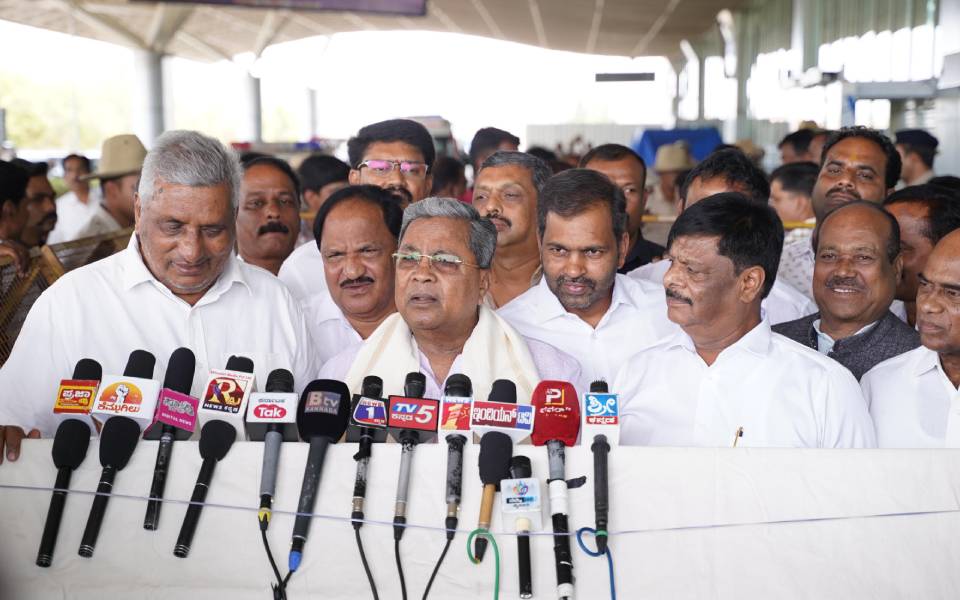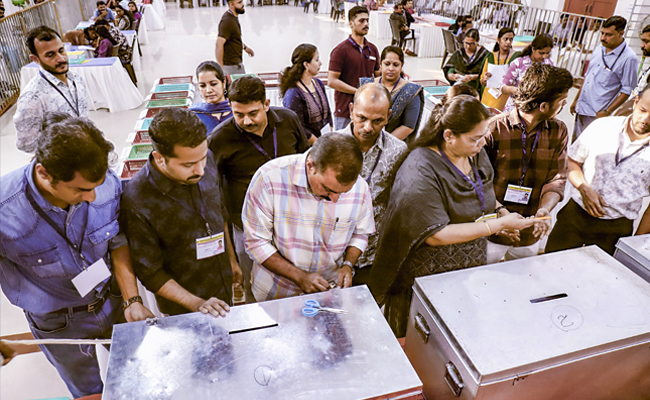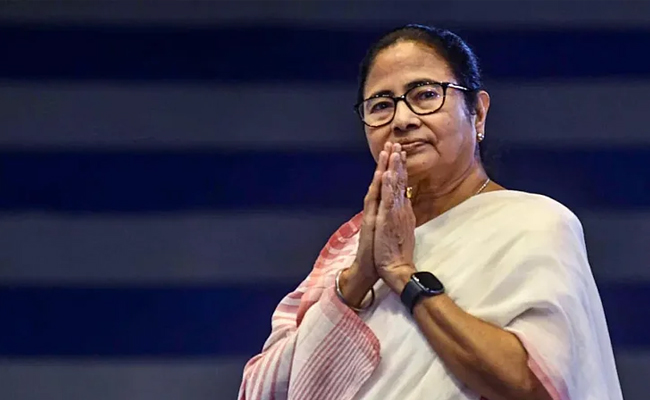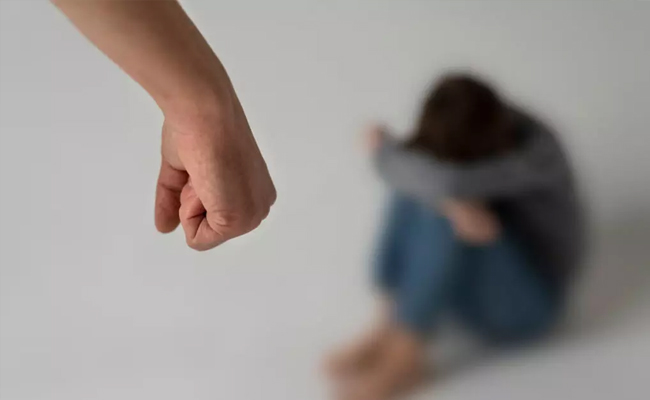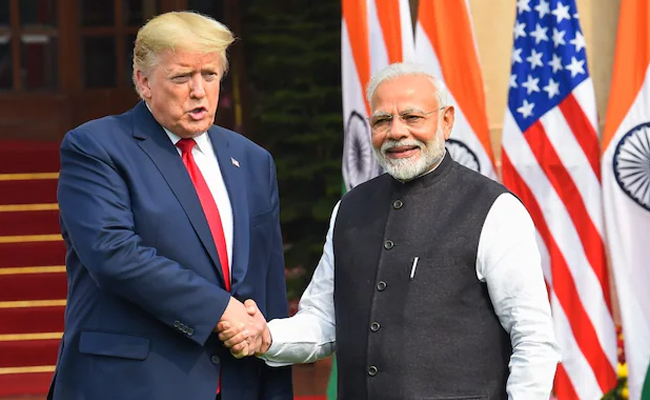Bengaluru, Jun 12: Taking note of severe drinking water woes in some places due to lack of rain in the last few days, Karnataka Chief Minister Siddaramaiah on Monday chaired a meeting in which he directed district administrations concerned to take immediate measures to ease people's worries.
The Chief Minister held a video conference with the district administrations of Bidar, Kalaburagi, Yadgiri, Raichur, Koppala, Bellary, Dakshina Kannada and Udupi districts of the state in this regard, and reviewed the Jal Jeevan Mission's progress in these eight districts.
The Jal Jeevan Mission is a scheme initiated by the Centre aimed at providing every rural household with drinking water supply in adequate quantity of prescribed quality on regular and long-term basis at affordable service delivery charges leading to improvement in living standards of rural communities.
"Monsoon has started in the state on June 10. As per the information from June 1 to 11, the state received less than the usual rainfall. There is a shortage of 67 per cent. The Meteorological Department has predicted that rainfall will be normal in the coming days," the Chief Minister's Office (CMO) said in a release.
But due to lack of rain in the last few days, the government has taken notice of severe drinking water problems in some districts, it said. In 15 districts of the state, drinking water is being provided through tankers in 322 villages and private borewells are being rented in 148 villages.
There was a drinking water problem in Dakshina Kannada and Udupi districts due to a shortfall in pre-monsoon rains, officials sharing the details of the meeting chaired by the Chief Minister said. As the monsoon has begun, the water problem is expected to be resolved in the coming days.
In Raichur and Koppal districts, though there is no shortage of drinking water, the issue of contaminated water is being taken seriously, they said. Senior officials of the Rural Development and Panchayat Raj Department have been instructed to visit the spot, conduct an inquiry and submit a report. Based on its report, the Chief Secretary has been directed to take action.
Zilla Panchayat CEOs should visit the taluk and the functioning of Panchayat Development Officers (PDOs) should be monitored. They should check the quality of water pipeline installation under the Jal Jeevan Mission scheme and have been suggested to take action in case of broken pipes or any other problem, the release added.
According to officials, the Chief Minister informed the district administrations during the meeting that the issue of drinking water should be dealt with carefully and action should be taken to provide water within 24 hours of the problem.
District in-charge secretaries were also instructed to take precautions in this regard, he said, adding if drinking water problem arises in any district, action should be taken to solve it immediately.
Warning that cases of consumption of contaminated water should not recur, Siddaramaiah told officials that it is their responsibility to provide clean drinking water to all people.
"Grants will be provided if required. Don't shift the responsibility by giving lame excuses. The issue of drinking water is a very sensitive issue. It would be good if it rains and the drinking water problem is solved. Otherwise, the authorities should be alert 24 hours a day and solve the water problem. Take action using the powers provided to you," he said.
The district in-charge officials have been asked to be in touch with the minister and provide proper information about the water problem, the release said. Care should be taken to ensure that there is no drinking water problem for cattle as well.
A review was made at the meeting regarding the implementation of the Jal Jeevan Mission in the state, and it was decided to identify projects with sustainable water sources under this scheme and implement them on priority basis.
It was decided to conduct a third party audit of the works of this project and reverse osmosis (RO) plants installed in the state.
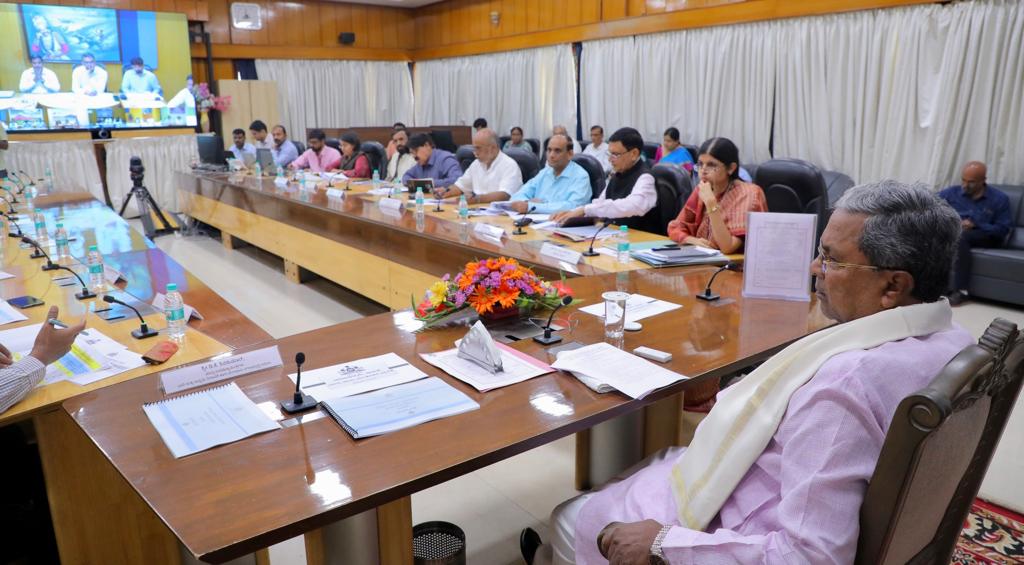
Let the Truth be known. If you read VB and like VB, please be a VB Supporter and Help us deliver the Truth to one and all.
Thiruvananthapuram (PTI): Buoyed by the strong performance of the Congress-led UDF in the local body polls, KPCC president Sunny Joseph said on Saturday that the front's results indicated the people had rejected the LDF government.
According to early trends, the UDF was leading in more grama panchayats, block panchayats, municipalities and corporations than the LDF.
The local body polls were held in two phases in the state earlier this week.
ALSO READ: Cong candidate who moved Kerala HC for name reinstatement in voter list, wins
Speaking to reporters here, Joseph said the people of Kerala had extended their support to the UDF.
"We could expose the LDF government’s anti-people stance and the people understood it. The LDF’s fake propaganda was rejected by the people. The UDF is moving towards a historic victory," he said.
He said a united effort, proper preparations, good candidate selection and hard work had resulted in the Congress and the UDF’s victory in the elections.
Asked about the prospects in the Thiruvananthapuram Corporation, Joseph said the party was studying the matter and would comment later.
LDF convenor T P Ramakrishnan said the results would be closely examined.
According to him, the government had done everything possible for the people.
"Why such a verdict happened will be examined at the micro level. People’s opinion will be considered and further steps will be taken," he said.
He added that decisions would be taken after analysing the results. "If any corrective measures are required, we will initiate them and move forward," he said.
AICC leader K C Venugopal said the results showed that people had begun ousting those who, he alleged, were responsible for the loss of gold at Lord Ayyappa’s temple.
"This trend will continue in the Assembly elections as well. It is an indication that the people are ready to bring down the LDF government," he said.
Venugopal said the UDF had registered victories even in CPI(M) and LDF strongholds.
"I congratulate all UDF workers for their hard work. Congress workers and leaders worked unitedly," he said.
Referring to remarks made by Chief Minister Pinarayi Vijayan against the Congress on polling day, Venugopal said the voters had responded through the verdict.
"I do not know whether the chief minister understands that the people are against him. Otherwise, he does not know the sentiment of the people. The state government cannot move an inch further," he said.
He said the results indicated a strong comeback for the UDF in Kerala.
Asked whether the Sabarimala gold loss issue had affected the LDF in the local polls, Venugopal said the CM and the CPI(M) state secretary did not take the issue seriously.
"We took a strong stand on the matter. The BJP played a foul game in it," he alleged.
On the BJP's role in the local body elections, Venugopal alleged that the party operated with the CPI(M) 's tacit support.
"The CPI(M) supported the central government on issues such as PM-SHRI, labour codes and corruption in national highway construction. The CPI(M) is facing ideological decline, and the state government’s policies are against the party’s own decisions," he said.
Meanwhile, LDF ally Kerala Congress (M) leader Jose K Mani said the party could not win all the wards it had expected in the elections.
He congratulated winners from all parties and said the party would closely examine the losses and identify shortcomings. "Later, we will take corrective measures," he added.
Senior Congress leader and MP Rajmohan Unnithan said the trends in the local body elections indicated that the UDF would return to power in the 2026 Assembly elections.
"We will win 111 seats as in 1977 and return to power in 2026. The anti-government sentiment of the people is reflected in the elections," he said.
Unnithan said the people were disturbed and unhappy with the present government.
"The trend indicates the end of the LDF government," he added.
CPI(M) MLA M M Mani said the people had shown ingratitude towards the LDF despite benefiting from welfare schemes.
"After receiving all welfare schemes and living comfortably, people voted against us due to some temporary sentiments. Is that not ingratitude," he asked.
Mani said no such welfare initiatives had taken place in Kerala earlier.
"People are receiving pensions and have enough to eat. Even after getting all this, they voted against us. This is what can be called ingratitude," he said.
Muslim League state president Panakkad Sayyid Sadiq Ali Shihab Thangal said the results were beyond expectations.
"The outcome points towards the Secretariat in Thiruvananthapuram, indicating that a change of government is imminent. We are going to win the Assembly election," he said.

